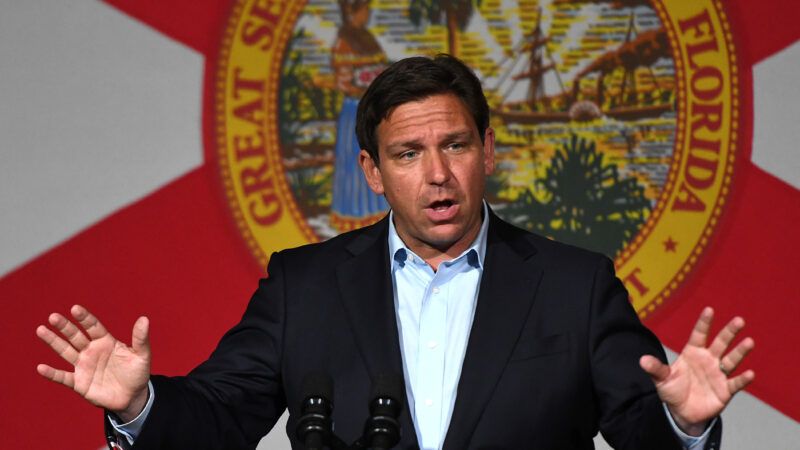Anti-Lockdown Governors Ran on Their COVID Records and Cruised to Victory
Republican Governors Ron DeSantis and Brian Kemp made a name for themselves opposing COVID mandates.

Anti-lockdown governors ran on their record of opposing COVID restrictions and coasted to easy victories in tonight's midterm election.
Across the country, Republican state executives who made a name for themselves by opposing business and school closures won reelection with far more comfortable margins than their first pre-pandemic runs.
"I lifted you up. I protected your rights. I made sure you could earn a living. I made sure you could operate your businesses," said Florida Gov. Ron DeSantis in an October debate against challenger Rep. Charlie Crist (D–Fla.).
By the end of the pandemic, DeSantis had become the face of Republican opposition to COVID restrictions. He opposed business and school closures, constrained local governments' ability to impose their own COVID policies, and waived fines that business owners had received for violating pandemic mandates.
DeSantis was far from a perfect libertarian on COVID. He issued an executive order prohibiting Florida businesses from adopting vaccination requirements. Though history forgets it, he was also somewhat more willing to close businesses during the early stages of the pandemic than some of his Republican peers. He ordered bars closed during a wave of cases in June 2020.
Still, voters rewarded DeSantis' record tonight with a crushing 60 percent of the vote. That's well above his narrow 2018 victory where he only earned a plurality of the vote.
How much of a role did DeSantis' COVID policies play in his victory? A University of South Florida poll from April found that most Floridians approved of the state's COVID response, but only 9 percent ranked COVID as their most important issue. That tracks with national polling showing that the pandemic is not voters' top concern.
Nevertheless, Republicans across the country were eager to run on the pandemic and appear to generally have been rewarded for it.
Georgia Gov. Brian Kemp earned massive national scorn for being one of the first governors to lift business restrictions in April 2020. The Atlantic famously described the move as "an experiment in human sacrifice."
Kemp was still happy to tout his record of keeping businesses open during a debate with Democratic challenger Stacey Abrams in October. By late Tuesday night, he was handily beat Abrams with 54 percent of the vote. That's an improvement on his 2018 showing against Abrams, when he won just over 50 percent of the vote.
Former Rep. Beto O'Rourke (D–Texas) inflammatorily accused incumbent Gov. Greg Abbott of killing Texans with his pandemic policies. It didn't seem to help him. Abbott coasted to victory with 55 percent. On the flip side, incumbent Democrats who supported harsh COVID restrictions have had a harder time retaining office, even if they did rewin election.
The economy topped the list of concerns among voters surveyed before the election. Inflation proved to be the most common concern listed by voters in early exit polls. Yet those inflationary pressures are downstream of an interventionist approach to COVID. The federal government engaged in trillions in deficit-financed spending to prop up an economy suffering the lingering effects of lockdowns. That spiked inflation rates.
The lousy economy helped create tonight's "red wave," which means the pandemic helped animate voters tonight, even if it wasn't on the top of their minds when they entered the voting booth.
